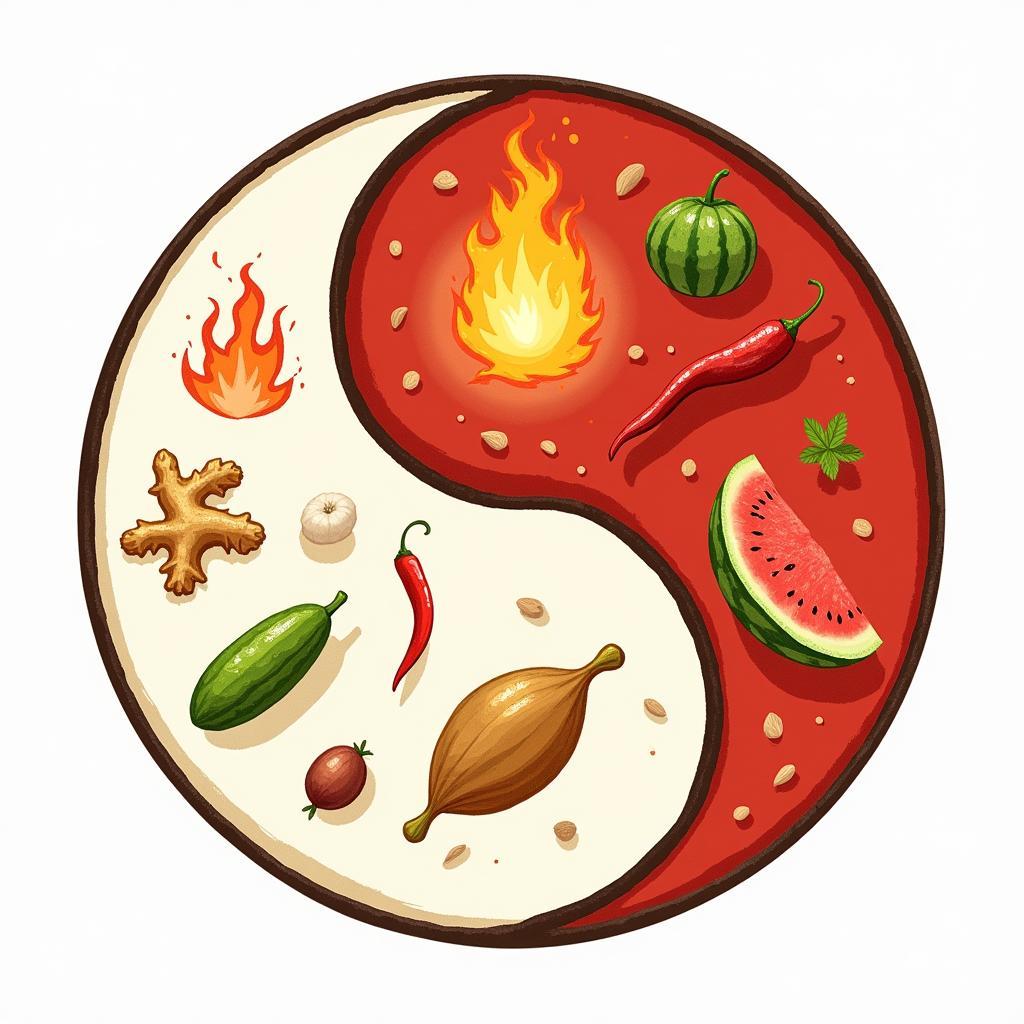Understanding the concept of hot and cold foods in Chinese medicine is crucial for maintaining balance and well-being. This isn’t about the actual temperature of the food, but rather its energetic properties and how it interacts with your body. Choosing the right foods based on these principles can significantly impact your health.
What Does “Hot” and “Cold” Mean in Chinese Medicine?
In Chinese medicine, “hot” and “cold” don’t refer to the physical temperature of food, but rather their energetic qualities. A “hot” food is believed to increase yang energy, generating warmth and stimulating circulation. Conversely, “cold” foods are thought to increase yin energy, having a cooling and calming effect. This concept is rooted in the principle of balancing yin and yang energies within the body to achieve optimal health. Consuming too much of one type of food can disrupt this balance, potentially leading to various health issues. For example, eating too many “hot” foods might lead to symptoms like inflammation or constipation, while an excess of “cold” foods could cause digestive sluggishness or chills.
 Yin and Yang Balance with Hot and Cold Foods
Yin and Yang Balance with Hot and Cold Foods
Identifying Hot and Cold Foods
So how can you determine whether a food is considered “hot” or “cold”? While there isn’t a definitive list, general guidelines exist based on the food’s taste, preparation method, and observed effects on the body. Spicy foods like chili peppers and ginger are typically considered “hot,” while cooling foods like watermelon and cucumber are classified as “cold.” Cooking methods also play a role. Grilling and roasting are considered “hot” methods, while steaming and boiling are generally “cold.” Observing your body’s response to different foods is another valuable tool. Does a particular food make you feel warmer or cooler? Does it improve or worsen specific symptoms? Paying attention to these subtle clues can provide personalized insights into how different foods affect your individual constitution.
Balancing Your Diet with Hot and Cold Foods Chinese Medicine
The key to using this knowledge effectively lies in understanding your individual constitution and adjusting your diet accordingly. If you tend to feel cold, incorporating more “hot” foods can help balance your energy. Conversely, if you frequently experience heat symptoms, increasing your intake of “cold” foods might be beneficial. This approach is about creating harmony within your body, not strict adherence to rigid rules.
Considering Your Environment and Season
The environment and the current season also play a role. During cold winter months, incorporating more warming foods like soups and stews can help combat the external chill. In the summer, lighter, cooling foods like salads and fruits can help you stay refreshed.
Hot vs Cold Foods for Specific Conditions
Chinese medicine practitioners often recommend specific dietary adjustments based on individual health conditions. For example, someone with a “cold” condition like a cough might be advised to consume warming foods like ginger and garlic. Conversely, someone experiencing a “hot” condition like inflammation might benefit from cooling foods like cucumber and mint.
“It’s crucial to remember that the ‘hot’ and ‘cold’ properties of food are relative and can vary based on individual factors,” explains Dr. Li Wei, a renowned practitioner of Traditional Chinese Medicine. “What might be considered a warming food for one person could have a neutral or even cooling effect on another.”
Common Misconceptions about Hot and Cold Foods
One common misconception is that “hot” foods are always spicy. While many spicy foods are indeed considered “hot,” not all “hot” foods are spicy. Similarly, not all “cold” foods are physically cold. Room temperature foods like lettuce or tofu can still have a cooling effect on the body according to Chinese medicine principles. Another misconception is that everyone should follow the same dietary guidelines. Individual needs vary greatly, and what works for one person may not work for another.
Conclusion
Understanding the concept of hot vs cold foods in Chinese medicine can empower you to make informed dietary choices that support your overall well-being. By paying attention to your body’s responses and adapting your diet to your individual needs and the environment, you can leverage the principles of Chinese medicine to achieve greater balance and vitality.
FAQ
-
Is ice cream considered a “cold” food? Yes, ice cream is considered a “cold” food due to its temperature and its effect on the body.
-
Can I eat both “hot” and “cold” foods in the same meal? Yes, incorporating a balance of both “hot” and “cold” foods in a meal is often recommended.
-
Are all fruits considered “cold” foods? While many fruits are considered “cold,” some, like dates and lychees, are considered more neutral or slightly warming.
-
How do I know my individual constitution? Consulting with a qualified Chinese medicine practitioner is the best way to determine your specific constitution.
-
Can changing my diet based on these principles cure diseases? While dietary adjustments based on Chinese medicine principles can support overall health and well-being, they should not be considered a replacement for conventional medical treatment.
-
Are there any resources for learning more about this topic? Yes, many books and online resources provide in-depth information about Chinese dietary therapy.
-
Is it difficult to incorporate these principles into a Western diet? Not at all. With a little understanding, you can easily adapt these principles to any dietary style.
Need further assistance? Contact us at Phone Number: 02437655121, Email: [email protected] or visit us at 3PGH+8R9, ĐT70A, thôn Trung, Bắc Từ Liêm, Hà Nội, Việt Nam. We have a 24/7 customer service team.